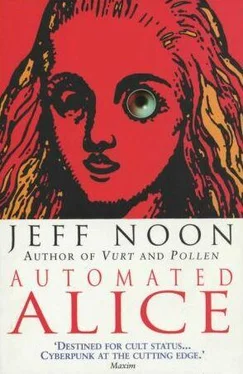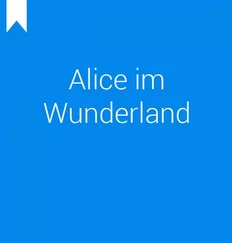Jeff Noon - Automated Alice
Здесь есть возможность читать онлайн «Jeff Noon - Automated Alice» весь текст электронной книги совершенно бесплатно (целиком полную версию без сокращений). В некоторых случаях можно слушать аудио, скачать через торрент в формате fb2 и присутствует краткое содержание. Издательство: Doubleday; Corgi, Жанр: Фантастика и фэнтези, на английском языке. Описание произведения, (предисловие) а так же отзывы посетителей доступны на портале библиотеки ЛибКат.
- Название:Automated Alice
- Автор:
- Издательство:Doubleday; Corgi
- Жанр:
- Год:неизвестен
- ISBN:нет данных
- Рейтинг книги:4 / 5. Голосов: 1
-
Избранное:Добавить в избранное
- Отзывы:
-
Ваша оценка:
- 80
- 1
- 2
- 3
- 4
- 5
Automated Alice: краткое содержание, описание и аннотация
Предлагаем к чтению аннотацию, описание, краткое содержание или предисловие (зависит от того, что написал сам автор книги «Automated Alice»). Если вы не нашли необходимую информацию о книге — напишите в комментариях, мы постараемся отыскать её.
Automated Alice — читать онлайн бесплатно полную книгу (весь текст) целиком
Ниже представлен текст книги, разбитый по страницам. Система сохранения места последней прочитанной страницы, позволяет с удобством читать онлайн бесплатно книгу «Automated Alice», без необходимости каждый раз заново искать на чём Вы остановились. Поставьте закладку, и сможете в любой момент перейти на страницу, на которой закончили чтение.
Интервал:
Закладка:
Jeff Noon
Automated Alice
"Think Borges crossed with Philip Larkin on acid and you've got some idea of the power of its very English enchantment." -- Arena
In the last years of his life, the fantasist Lewis Carroll wrote a third Alice book. This mysterious work was never published or even shown to anybody.
It has only recently been discovered. Now, at last, the world can read of Automated Alice and her fabulous adventures in the future.
That's not quite true. Automated Alice was in reality written by Zenith O'Clock, the writer of wrongs. In the book he sends Alice through time, tumbling from the Victorian age to land in 1998, in Manchester, a small town in the North of England.
Oh dear, that's not at all right. This trequel to Alice in Wonderland and Through the Looking Glass was actually written by Jeff Noon. Zenith O'Clock is only a character invented by Jeff Noon and any resemblance to persons living or dead is purely accidental. What Alice encounters in the automated future is mostly accidental too... a series of misadventures, even weirder than your dreams.
"Captures Carroll's style effortlessly... a weird Alice with a contemporary edge." -- Mail on Sunday
"A wild, psychedelic vision... I doubt that there will be a more joyously inventive book published in Britain this year." -- Manchester Evening News
Now in my trembling days I seek
All comfort to be found
In contemplation of the past;
When we rowed aground
At Godstow on the Thames' bank,
With my sweet Alice bound.
And there beneath a spreading elm
I told a tale of joy
To a child who smiled to hear
This older man's employ.
But now that girl is married to
Some fine and dashing boy.
And I am near my maker's house,
There to sup the chalice,
With one last tale to tell as time
Works my shape with malice;
Of how a child will become my
Automated Alice.
Now in these final days I seek
To find a future clime;
In which my Alice can escape
The radishes of time.
Faster, faster ticks the clock that
Turns to end this rhyme.
Through the Clock's Workings
Alice was beginning to feel very drowsy from having nothing to do. How strange it was that doing absolutely nothing at all could make one feel so tired. She slumped down even deeper into her armchair. Alice was visiting her Great Aunt Ermintrude's house in Didsbury, Manchester; a frightful city in the North of England which was full of rain and smoke and noise and big factories making Heaven-knows-what. "I wonder how you do make Heaven-knows-what?" thought Alice to herself. "Perhaps they get the recipe from somebody who's only recently died?"
The thought of that made Alice shiver so much that she clutched at her doll ever so tightly! Her Great Aunt was a very strict old lady and she had given Alice this doll as a present with the words, "Alice, the doll looks just like you when you're in a tantrum." Alice thought that the doll looked nothing like her at all, despite the fact that her Great Aunt had sewn it an exact (if rather smaller) replica of Alice's favourite pinafore; the splendidly warm and red one she was currently wearing. Alice called the doll Celia, not really knowing the reason for her choice. Alice would often do things without knowing why, and this made her Great Aunt very angry indeed: "Alice, my dear," she would pronounce, "can't you make sense for once?"
Alice now hugged the Celia Doll even closer to her chest, where she wrapped it in the folds of her pinafore: this was all because of the lightning that was flashing madly outside the window, and the November rain that was falling onto the glass, sounding very much like the pattering of a thousand horses' hooves. Her Great Aunt's house was directly opposite a large, sprawling cemetery, which Alice thought a horrible place to live.
But the very worst thing about Manchester was the fact that it was -- oh dear! -- always raining. "Oh Celia!" Alice sighed to her doll, "if only Great Uncle Mortimer was here to play with us!" Great Uncle Mortimer was a funny little man who would always have a treat tucked away for Alice; he would amuse her with jokes and magical tricks and the magnificently long words that he would teach her. Great Uncle Mortimer was, according to her Great Aunt, "big in the city", whatever that could mean. "Well," said Alice to the doll, "he may well be big in the city, but when he gets back to his home he's really rather small. Perhaps he's got two sizes, one for each occasion. How splendid that must be!" Great Uncle Mortimer would spend every night smoking on his pipe whilst adding up huge rows of numbers, and wolfing down a great plateful of the radishes that he grew for himself in the vegetable garden. Alice had never seen so many numbers before (or so many radishes). She was not awfully good at mathematics (or radish eating), and the numbers one to ten seemed quite adequate to her. After all, she only had ten fingers. Why should anybody need more than ten fingers? (Or, for that matter, more than one radish?)
These idle thoughts only made Alice realize how dreadfully bored she was. Great Aunt Ermintrude had three daughters of her own (triplets in fact) but they were all much older than Alice (and Alice always had trouble telling them apart), so they weren't much fun at all! There was nothing to do in Manchester. The only sounds she could hear were the pitter-pattering of the rain against the window and the tick-tocking, tick-tocking of the grandfather clock in the corner of the room. The housemaid had dusted the clock this very morning and the door of it was still open. Alice could see the brass pendulum swinging back and forth, back and forth. It made her feel quite, quite sleepy, but at the same time quite, quite restless. It was at this very moment that she noticed a solitary white ant marching across the breakfast table towards a sticky dollop of Ecklethorpe's Radish Jam; the maid had neglected to remove this in her cleaning. Alice had tried a spoonful of the radish jam (it was Uncle Mortimer's favourite preserve) on a piece of toast that very morning but had found the taste of it too sickly sour. The ant was now running over the jigsaw puzzle that Alice had spent the whole morning trying to complete, only to find (frustratingly) that fully twelve pieces were missing from the segmented picture of London Zoo. "Oh, Mister Ant," Alice said aloud (although how she could possibly tell it was a Mister from that distance is quite beyond understanding), "how is it that you've got so much to do, whilst I, a very grown-up young girl, have got so very little to do?"
The white ant, of course, did not bother to make an answer.
Instead it was Whippoorwill who spoke to Alice. "Who is it that smiles at ten to two," he squawked, "and frowns at twenty past seven, every single day?" Whippoorwill was a green-and-yellow-plumed parrot with a bright orange beak who lived in a brass cage. He was a very talkative parrot and this pleased Alice -- at least she had somebody to converse with. The trouble was, Whippoorwill could only speak in riddles.
"I don't know," answered Alice, grateful for the diversion. "Who does smile at ten to two, and frowns at twenty past seven, every single day?"
"I'll tell you the answer if you open my cage."
"You know I daren't do that, Whippoorwill. Great Aunt would be very angry."
"Then you'll never know," squoked the parrot. (Squoking is how a parrot talks, exactly halfway between speaking and squawking.)
"Oh well," Alice thought, "I suppose it won't do very much harm to open the cage door just a little way." And even before the thought had finished itself, Alice had pulled herself and Celia Doll out of the armchair and made her way over to where Whippoorwill's cage stood on an alabaster stand. "Now you really won't try to escape, will you?" said Alice to the parrot, but the parrot had no answer to give her: he clung to his perch and turned a quizzical eye towards the young girl. Seeing that quizzical eye, Alice could do nothing more than to release the tiny brass catch, and let the cage door swing open.
Читать дальшеИнтервал:
Закладка:
Похожие книги на «Automated Alice»
Представляем Вашему вниманию похожие книги на «Automated Alice» списком для выбора. Мы отобрали схожую по названию и смыслу литературу в надежде предоставить читателям больше вариантов отыскать новые, интересные, ещё непрочитанные произведения.
Обсуждение, отзывы о книге «Automated Alice» и просто собственные мнения читателей. Оставьте ваши комментарии, напишите, что Вы думаете о произведении, его смысле или главных героях. Укажите что конкретно понравилось, а что нет, и почему Вы так считаете.











